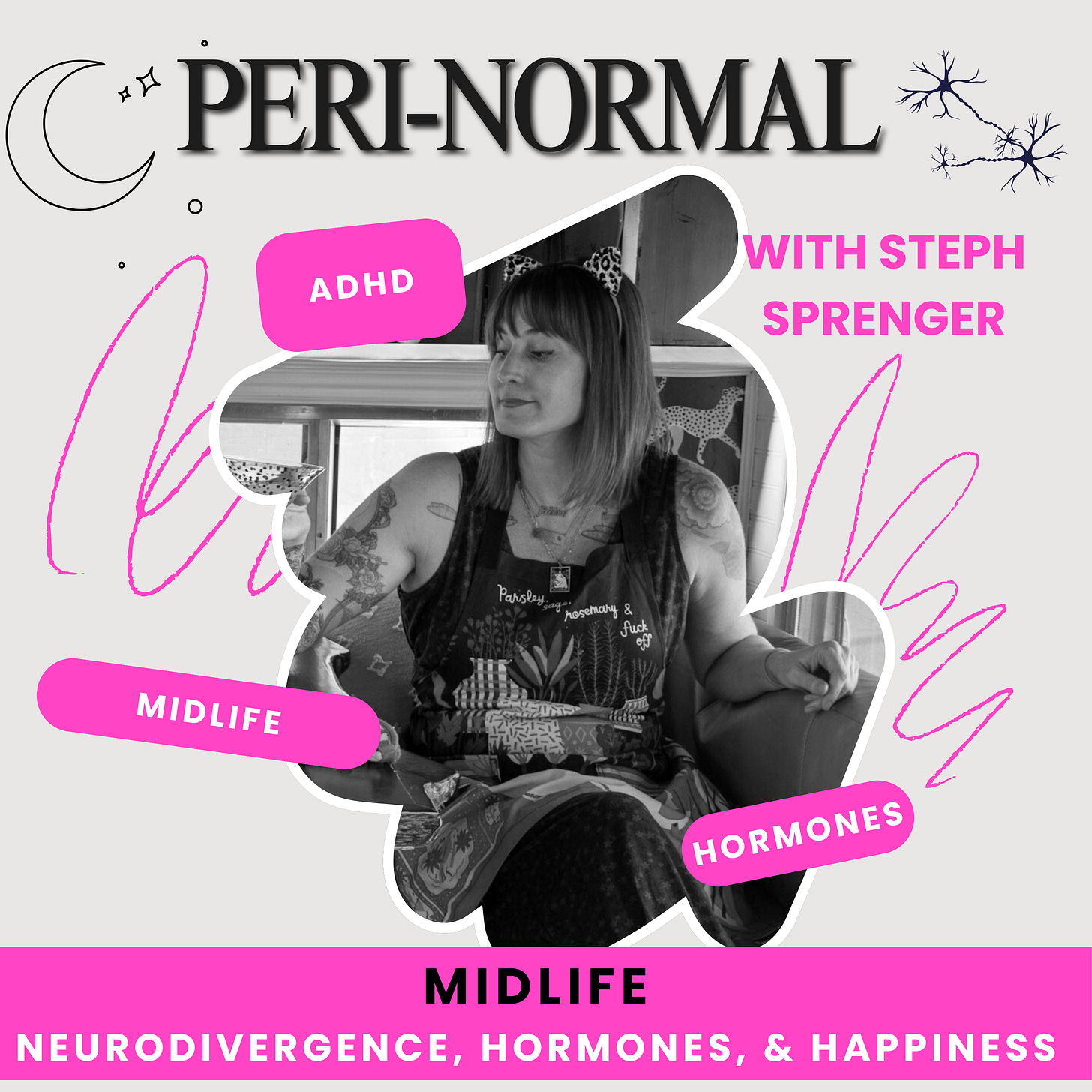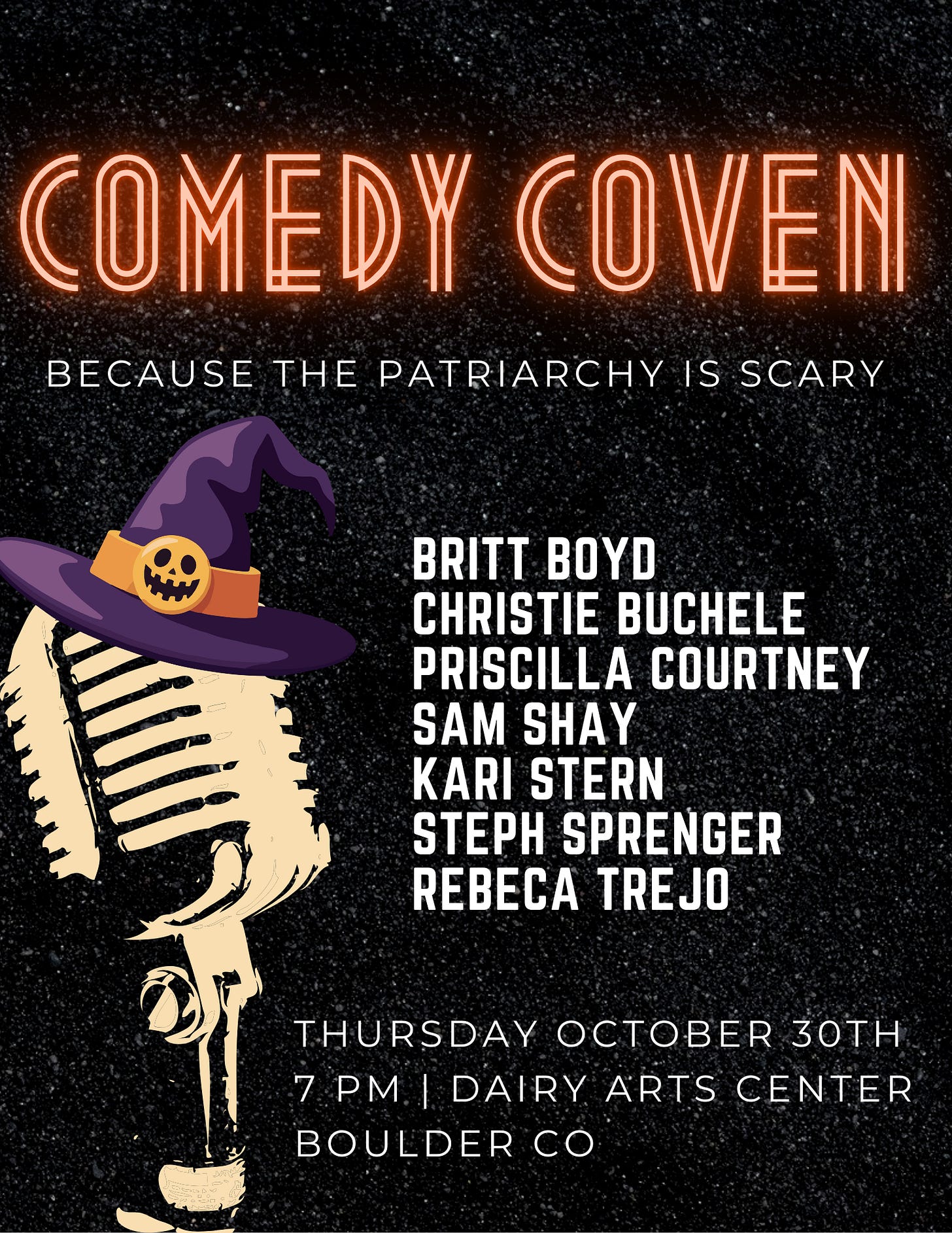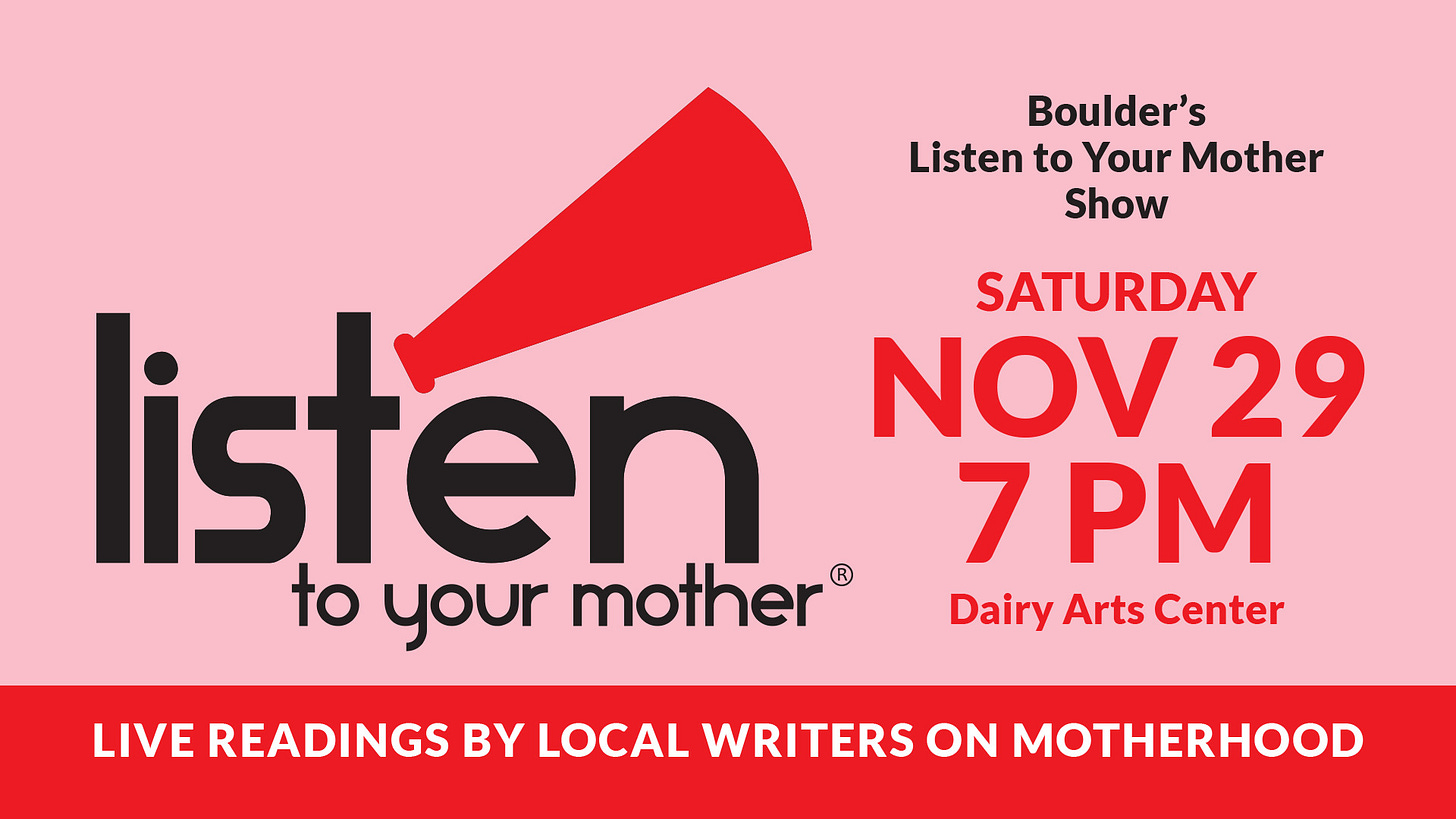Latchkey Crones
Gen X women are powerful, and we are tired of being quiet.

I had the most incredible conversation with the talented
of This Is Not Your Mother's Eating Disorder last week. She was a guest on the Peri-Normal podcast, and we covered midlife ADHD diagnoses, peri/menopause, and the prevalence of eating disorder recurrences during this stage of life. Amie loves having the messy, gritty, raw, honest conversations that are my bread and butter, so we spent an hour digging in the dirt together, laughing way too much, and expressing our frustration that so much of our own wellness has been placed in our own hands. You can listen to our podcast episode—The Slippery Slope of DIY Women’s Health: ADHD, Menopause, and Midlife Eating Disorders—here.A few months ago, I wrote a post called Gen X Women are here to save you: midlife women will not go gentle into that good night. It had to do with midlife female protagonists rising to power in the media and how women are finally speaking openly about our bodies, and talking to Amie re-kindled that fire of optimism and courage.
DIY women’s health: Where did all the experts go?
When I was talking to Amie, she hit me with this mic drop:
“ I find these conversations so interesting—this conversation with you, the conversations I’m having with other women between this perimenopausal and menopausal age—because we pepper in all this estrogen and cortisol and dopamine and lack of testosterone and midlife ADHD. . . and you know, I think we’re piecing these things together for ourselves. We are piecing these things together for ourselves and with each other, and it’s fascinating to me—it’s important that we are having these conversations, that we are talking to each other, we’re talking about the hormones, we’re talking about the shifts and changes.
And I also think there is this big DIY aspect to this—we are trying to figure out, how do we do this? How do we do this in what has felt like, for me, and I think for others, a black hole of information. I am really appreciative of these conversations, and at the same time, I want us to be able to move on from DIY to “Yes, this is real.”
I completely agree with her point—I love that we are pulled to a “return to the campfire” of sharing our stories and sharing our wisdom with other women. I love that we are talking about it openly and with generosity and curiosity.
But for the love of god, could we ditch this “secret knock” culture of women’s health? Do we have to know exactly what to ask for in order to be seen, to be helped?
I spent last weekend talking with some other women in their late forties—these are women I hadn’t seen in years—and I swear, there was no “catch up.” There was no, “Tell me about your work; how are your kids?” We cut right to hot flashes, estrogen, pelvic floor health. . . I mean, the lack of small talk was astonishing and also, such a relief. (I mean, I hate that shit.) These women were having perimenopause symptoms that were causing them to suffer, and nobody had said anything to them about it.
Doctors are not asking us if we are having night sweats, or mood lability, or dry skin (or vaginas, for that matter) at our annuals. The only reason I *knew about it* was because of the happy hour I hosted when I realized every single one of my best friends was on estrogen except me. I can’t tell you how many women in their forties and fifties I have heard say these words: “Nobody warned me about this.” So I guess that makes us the official Welcome Wagon to Perimenopause. The town criers alerting women in their mid-thirties with a foretaste of the feast to come—this feast sucks, by the way. Dress in layers and never, ever arrive without emergency tampons and back-up underwear.
At a high school volleyball game this week, I caught myself right before I leaned over to the friend next to me and whispered, “Are you in perimenopause yet? Because this shit sucks. I’m having the first real period I’ve had in three months and I drove around all day crying for no reason.” Then I reminded myself that the Peri Welcome Wagon doesn’t need to be quite so visible at public sporting events, and that there’s a time and place for vag talk.
Last weekend at the brewery during the reunion/ “Public Cervix Announcement,” (you’re welcome; I’ll be here all week), when I talked about my estrogen patch, my oral progesterone, my insulin resistance and CGM, the other women were like, “Wait, I can just go to my doctor and tell her what I want? Isn’t that offensive?” Listen, I grew up as a Scandinavian Lutheran Midwest Gen X girl. In many ways, I am the nicest, don’t-rock-the-boat person around (yes, I also swear on the internet and talk about things nice girls aren’t supposed to. . .) and the last thing I ever wanted to do was march into my OB-GYN’s office demanding .025 of estradiol like I’d gone to Web MD’s online medical school.
But here’s what I did instead—I told her I was having night sweats, poor sleep, dry skin, aching joints, and I was curious about whether it might be time to consider estrogen. What’s wrong with that? Nothing. And it worked. And when we upped my dose and it disrupted my sleep and I requested oral progesterone, she agreed.
It’s no different than when I essentially self-diagnosed with ADHD, emailed a practitioner, and requested an evaluation. And guess what? I was right. I do have ADHD, and I did need meds.
Know thyself
Someone recently asked me how I was able to be so strong and resolved during my divorce (not my words), given that I had so many obstacles—finances, being the sole custodial parent, being self-employed, having a high-conflict divorce. I said I’d been in therapy for half my life, journaled and meditated (and medicated, ha!) every day, and have been “oversharing” in communities small and large for a decade. I don’t know how to not be open.
I am not trying to be self-congratulatory here—my point was this: For the past twenty years, I have been in the business of learning myself. Knowing myself. Not because I am a navel-gazing narcissist, although many of you know gazing at my navel is one of my top ten favorite hobbies. But because I know the truth—that the more I (you, we, all of us!) know myself, understand myself, nurture myself with the correct owner’s manual, and express the truth I am discovering, the better I am at everything else. Mothering. Friendship. My work. My relationships. Teaching. Learning yourself is not a selfish endeavor. It helps you create ripples that touch other people and help them feel better, too.
I think Gen X is the first therapy generation. Until recently, we as a society did not go to therapy just to understand ourselves, make our relationships more harmonious, learn the intricacies of our own systems, or to identify our attachment styles, temperaments, and individual saboteurs. But we do now. And I make no apology for being all in when it comes to knowing myself and advocating for my own happiness and health.
I certainly wish our communities—teachers, doctors, therapists, and other professionals—were looking out for us and advocating for us. Some of them are. We are getting there. But until paying attention to girls’ and women’s hormonal health, neurodiversity, emotions, and ever-changing bodies becomes the norm, I will absolutely continue to fight this fight on my own, insisting on a seat at the table of Being Relevant and Feeling Well.
Gen X Women: The Latchkey Crones
Halfway through my conversation with Amie, as we tried to untangle how we’ve gotten to this moment of coming together as women to share our wisdom, regrettably DIY-ing our own health, and processing where exactly we are in the Maiden-Mother-(Oft-ignored Queen)-Crone cycle, I had a revelation. “Amie,” I said, “Do you know what we are? We are the Latchkey Crones. Gen X women are Latchkey Crones.”
Amie’s words stuck with me:
“That is what it means to be Gen X, right? It’s to be carving our own path. We’ve always had to take care of ourselves, and I think in particular as Gen X women, we are bridging the Boomer generation and the Millennial generation. And I think we’ve been on our own for a long time. We’ve had to build this, you know, and I love that we are building it. And you know what? We’re building it for ourselves.”
So, fellow Latchkey Crones, here is my challenge to us. Let’s keep gathering around the fire. Let’s keep telling the others. Continue to share what’s happening in your body, your brain, your marriage, your work. Continue to resist being quiet. Encourage others to ask the hard questions, to go to their doctors and therapists with a script to advocate for themselves. Let’s model being strong and loud and persistent. And let’s demand a seat at the table of feeling good. It is our right to be researched and studied and understood and validated and cared for. And not just for ourselves.
I am proud to be a Gen X woman. I am proud to be a 47-year-old perimenopausal neurodivergent single mom. I am proud to be a Latchkey Crone. My wisdom was hard won, and so was yours. And our wisdom is just getting started—there is so much beauty and joy and growth still to come.
I’d love for you to listen to my conversation with Amie on the Peri-Normal podcast. Whether or not you’ve experienced disordered eating, I think you’ll recognize the struggle of midlife women to be our own health advocates as we navigate our bodies and brains at this stage of life.
XO,
Steph
Here’s what’s coming up:
Comedy Coven is back!
LTYM Boulder Holiday Show
WRITING WORKSHOPS:
It’s Time for Your Book just started, and there’s still time to join! Details here.
Join MidCircle, a writing community for midlife women. Membership includes regular co-working sessions, weekly workshops, critique group opportunities, writing prompts, and discussion. Check out our a la cart workshop calendar here.







Sooooo glad to know that it's not just me! I have been experiencing peri symptoms for a decade now, with the worst kicking in around 4 years ago. At this point, it's almost the only thing I want to talk about -- that and how much I freaking hate the patriarchy. I was so deep in rage, exhaustion and despair that the only thing I could do to start to drag myself out was write. Write stories with Gen X women, putting them at the centre of things -- where we have never really been, not unless we look or behave a certain way!
Thank you for sharing this article, it's important work that we need more of.
👏👏👏this is me giving a standing ovation to everything you said here